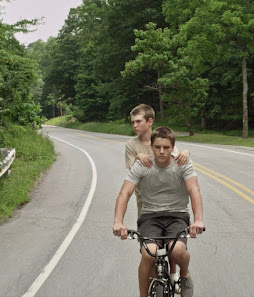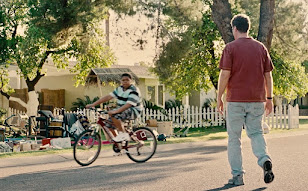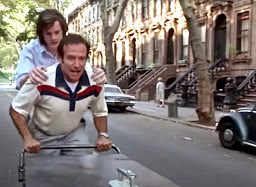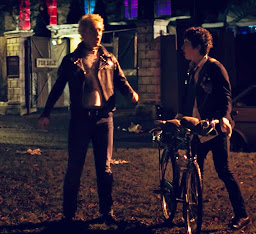Penicillin: The Magic Bullet (Gorden Glenn, dir., 2006) describes how Alexander Fleming took credit for the discovery of antibiotics after deeming this cheese mold spore unfit for use on humans. Oxford scientist Howard Florey teamed with biochemist refugee Ernst Chain and lab technician Norman Heatley to extract the first thimbleful of powder, which they injected into first human test subject, and transported urine samples back to lab by a relay race of bicyclists to produce more. Though injured bobby they treated died for lack of sufficient quantity, it proved penicillin wasn’t magical whimsy but medical cure. Took American war machine to ramp up production, which saved an estimated three hundred thousand troops after D-Day. Hitler also took credit out of petty jealousy and pure malice. Fleming has a crater named after him on the moon. Few remember Oxford pioneers whose dedicated efforts have alleviated suffering and extended millions of lives since. Isn’t that usually the case?
Adam (Michael Stasko) discovers Things To Do (Ted Bezaire, dir., 2006) whether or not he wants to after he leaves a big city job and retreats to small time family’s home. Mom insists he do some grocery shopping, so he breaks out his ten speed. There he runs into Mac (Daniel Wilson), who provokes all sorts of adventures.
Bicycling artist Piper (Elizabeth Harnois) begins a job at Beach City Grill making Ten Inch Hero (David Mackay, dir., 2007) sub sandwiches for hippie boss Trucker (John Doe). Her move to Santa Cruz has to do with stalking her presumed daughter Julia (Adair Tishler), who she gave up for adoption after becoming pregnant at 15 years old. Both dad Noah (Sean Patrick Flannery) and daughter ride their bikes to a nearby beach, where she secretly imposes on their lives. Northern California suits her better than western Pennsylvania.
The Soloist (Joe Wright, dir. 2009) describes schizophrenic Nathaniel Ayers (Jamie Foxx, Academy Award for Best Actor) before his slide into homelessness. After a bicycling accident, LA Times reporter Steve Lopez (Robert Downey, Jr., Iron Man) befriends Nate, and tries to improve his life. Downey does another bike dive in The Judge (David Dobkin dir., 2014), previously reviewed.
Another animated feature, Aardman big budget Arthur Christmas (Sarah Smith, dir., 2011) stars James McAvoy in title voiceover role. Arthur Claus, Father Christmas’ awkward grandson, answers letters to Santa. He takes his background role seriously, since Santa has a reputation to uphold: Coming through for kids and delivering to all who deserve gifts. He personally assures English girl Gwen she’ll get her heart’s desire: A shiny pink bicycle. His brother Steven (Hugh Laurie) manages vast corporate facility buried beneath North Pole that employs countless elves and manufactures a billion gifts distributed before daylight on Christmas Day. Steven hopes to inherit Santa’s role from his father Malcolm Claus, who is showing signs of slipping in his advanced years. Malcolm almost gets seen by children, which alerts an elven rescue and diverts bike’s dispatch. Wrapping elf Bryony Shelfley (Ashley Jensen) notices error. Arthur, Bryony, and Grandsanta set off to save Christmas but run into one disaster after the next. Arthur unwraps gift bike to race to final destination before sunup, while Bryony rewraps it on route. All four Clauses convene on scene to watch Gwen get her wish, which she immediately puts to use outdoors and surprisingly gets a glimpse of the new Santa, Arthur, just as he escapes. Film earned $50 million and won scores of minor awards.
Ciclovida Lifecycle (Loren & Matt Feinstein, dirs., 2011) follows Brazilian farmers Inacio and Ivania, who collect and distribute heirloom seeds and spread potent ideas throughout South America, without cash support or motor vehicles, by pedaling 6,000 miles by bicycle in a year. They expose monocultures of alcohol producing plants used in unsustainable motor fuels. Johnny “Appleseed” Chapman comes to mind as an inverse inspiration by hiking on foot and planting nonnative seeds around America’s mid-1800’s frontier.
Chinese dramas Drifters and 11 Flowers (Wang Xiaoshuai, dir., 2003 and 2011, respectively) cover what ordinary life was really like over the course of a lifetime during cultural revolution and in a contemporary small town. A drifter fathers a son while working illegally in America, is repatriated to China, then sorrowfully receives visiting son he’s not allowed to keep after riding him on his handlebars to meet grandfather. When school boy of later film is selected to lead daily gymnastics, he must wear a new white shirt, which puts a strain on his struggling family's finances in a remote Guizhou village. He loses shirt in an encounter with a desperado, who keeps his promise to replace it from prison. Bike commuter dad and homemaker mom don’t approve.
Small town New Jersey brothers Eric (Nathan Varnson) and Tommy (Ryan Jones) are well advised to Hide Your Smiling Faces (Daniel Patrick Carbone, dir., 2013). Tommy rolls through a fast food takeout on his BMX, pays for a meal, then pal runs by and snatches it; Tommy smiles after food service girl replaces order, and they eat together as planned. But after finding Eric’s younger friend Ian dead at the base of an abandoned train bridge, summer no longer seems a school vacation to while away days casually exploring woods, painting graffitis, scamming townsfolk, and vandalizing vacancies. Audience is left to wonder: Homicide or suicide? Brothers go for a solemn BMX ride to muddle through in their varying stages of grief: Denial, anger, bargaining, depression, and acceptance. At 2020’s summer's end, millions of American families face the same and look for whom to blame.
The Hundred Foot Journey (Lasse Hallström, dir., 2014) lies between Madam Mallory’s (Helen Mirren) Michelin 5 star haute cuisine fixture favored by celebrities and heads of state and Papa Kadam (Om Puri) family’s Indian eatery just opened in an abandoned provincial building across the road. His chef son Hassan gradually grows interested in what Mallory offers as well as her head chef Marguerite (Charlotte Le Bon), with whom he takes bike spins into gorgeous Pyrennes hills. Cultures collide in this village gridrion. No wonder Tour de France always passes that way.
Sister of 34-year-old triathlete Nancy (Lake Bell) urges her to Man Up (Ben Palmer, dir., 2015) 4 years after her divorce. Mistaken identity has her on a blind date with 40 year old Jack (Simon Pegg), who thinks she is twentysomething Jessica (Ophelia Lovibond), which goes well until she runs into an acquaintance who calls her by her real name. After Jack's actual date with Jessica, he begins to pine for shapely cyclist Nancy. In recently cancelled sitcom Bless This Mess, Season 1, episode 5, one scene has Lake's character ride her bike into a lake after being sent on a goose chase by a jealous frenemy. Bell, automotive contributing editor for The Hollywood Reporter, used to write car column Test Drive, so wonder why she has become linked with cycling, as is Pegg. Bad influence?
The Book of Henry (Colin Trevorrow, dir., 2017) contains instructions from a son (Jaeden Martell) to his single mother Susan (Naomi Watts) on how to save girl next door, Christina (Maddie Ziegler), who is the abused stepdaughter of police commissioner. After gathering evidence by bicycle, Henry convinces mom to take covert action. Police generally get a bad rap, as do politicians, priests, and whoever is placed above civilians for everyone’s benefit, because a few betray trust bestowed, overstep bounds, or take personal advantage of power.
Veronica (Olivia Holt) gets the shock of her privileged Louisiana life when her high school Class Rank (Eric Stoltz, dir., 2017) comes out as only #2. Not taking it lying down, she masterminds a plan to get a bicycling classmate, bright but clumsy Bernard (Skyler Gisondo), to run for a seat on Livingston School Board and reverse any academic impediment to her getting into Yale. Critics liked this romantic comedy with scenes stolen by Bruce Dern and Kathleen Chalfant, but it got lost at box office and went quickly to DVD.
When Flemish cycling champion Thierry (Vincent Rottiers) takes a trip to Senegal to recoup after a crash, he meets prostitute Fae (Fatou N’Diaye), a fallen angel, Un Ange (Koen Mortier, dir., 2018). It’s love at first sight, but troubles over racial prejudice they face with dignity and hope. Based on a novella by Dimitri Verhulst that delves into suspicious death in 2009 of real life cycling star Frank Vandenbroucke, who won many European races and World Championship in 1990s, it reveals how famous athletes suffer under withering expectations of public fans and team leaders. Selling your body has multiple meanings, such as doping and pushing beyond all reason to perform and win. Family issues overwhelmed and knee surgery sidelined, following a 2004 suicide attempt Frank explained, “I put on my world champion's jersey, I injected myself [with 10 cc of Actrapid insulin]... then I went to lie on my bed and I waited to die. I was so happy.”
Flandrien hopeful Felix Vereecke (Niels Willaerts) grew up in an insular realm of professional racing surrounded by alcohol, cheats, drugs, egos, fisticuffs, obsessions, rivalry, and tunnel vision. But his own bid to become a Coureur (aka, The Racer, Kenneth Mercken, dir., 2018) doesn’t pan out. His body rejects EPO experiments, so his dad gives blood transfusions. Nothing, not even cancer, can stop him from competing in this dark and dirty world. In Dutch and Italian, it’s based on Mercken’s own life in the peloton.
Still from racial drama Blindspotting (Carlos López Estrada, dir., 2018) shows a fat tire BMX wheelie.
A fan maintains a page on IMDB.com lists feature films, not documentaries, that depict cycling competitions. Some of its entries outdate Labann himself, who mentioned most of them already. You may find others among Krigogstoffer’s 3 dozen to consider viewing while knocking back a Fat Tire Belgian Ale or Samuel Adams Porch Rocker Radler, which was inspired by German cyclists who make something analogous to a British shandy when they mix 1 part lemonade and/or limeade with 2 parts lager, even better when served by bixi-babe wearing a Karen Scott designer bicycle tee. Why not?
One title that stands out, psychological thriller Sombre (Philippe Grandrieux, dir., 1998), divulges an even darker current to Tour de France: Serial killer Jean (Marc Barbé) cruises route and dispatches prostitutes. He meets unstable virgin Claire (Elina Löwensohn) and her sister, whose car has broken down. Instead of murdering these new recruits too, he lets Claire escape their crepuscular rendezous, though he returns to his predatory prowl of spectators, disturbingly suggested by final scene [shown]. Critics found film’s blurry solemnity and remorseless menace offensive, but Labann seeks such bicycling culture examples within a nexus comprehensive.
Renewed Intuition (Thibaut Grevet, dir., 2020) is a short (or should it be called a brevet?) about Michelle Le Gaffric riding a bicyclette in Paris, while Yann Bean reads a poem by Dylan Cox. It is oh so French describing a vélo experiences and sensations while serving as product placement for Brooks Saddles of England. It begs, “Give us television and time; free us from freedom.” Bicycles, after all, exist as a response to city residence and modernity sufferance, so not exactly a freedom machines but navigational mechanism and pluralism redeemer among civilized society. Frame's teyne, i.e., surface plating, has little impact on intended purpose; bright or dull, all's well as long as you can propel.

























































